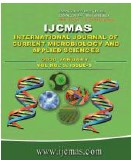


 National Academy of Agricultural Sciences (NAAS)
National Academy of Agricultural Sciences (NAAS)

|
PRINT ISSN : 2319-7692
Online ISSN : 2319-7706 Issues : 12 per year Publisher : Excellent Publishers Email : editorijcmas@gmail.com / submit@ijcmas.com Editor-in-chief: Dr.M.Prakash Index Copernicus ICV 2018: 95.39 NAAS RATING 2020: 5.38 |
The use of novel food technologies like genetic modification technology, nanotechnology and food irradiation technology have received mixed responses from the public. But there is limited information available about consumers’ attitudes toward food derived from cattle clones, when compared to what is known about consumers’ responses to genetically modified food in general. In a survey conducted by the International Food Information Council (IFIC), 2007, in US, 49 per cent of consumers had a likelihood of purchasing foods from the offspring of cloned animals if determined safe by the FDA, while in China, a net 66 per cent of the consumers preferred to buy GM food if they were more nutritious. The objective was framed to investigate the various factors influencing the likelihood of researchers to consume cloned animal products, with the aim to develop a statistical model for predicting their acceptance decision. The salient findings of the study was found that the consumers used to prefer environment friendly cloned product, followed by price 10 percent lesser to traditional ones and availability in RTS type of product. Hence while formulating policies regarding purchasing of cloned animal products, the significant variables should be given importance meat from cloned animals, lesser price,such as products should indicate the ingredients, environmentally friendly, higher nutrient value, free from chemicals and safe to eat.
 |
 |
 |
 |
 |